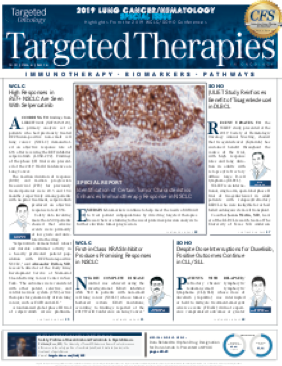Advances From the World Conference on Lung Cancer and New Developments in Relapsed Lymphoma and Immunotherapy
Emerging from the recent 2019 World Conference on Lung Cancer are several notable developments, Robert L. Ferris, MD, PhD, wrote in this issue of <em>Targeted Therapies in Oncology. </em>
Robert L. Ferris, MD, PhD

Robert L. Ferris, MD, PhD
Emerging from the recent 2019 World Conference on Lung Cancer are several notable developments. Treatment results seen in this disease demonstrate the success of precision oncology and genomics-driven targeted therapy for some patients. However, lung cancer also presents several obstacles for effective development of targeted oncologic therapies.
First, there is the challenge of genetic/genomic instability and progressive evolution observed in these cancers. Although oncogene “addiction,” or predominance, is apparent in some situations, potential pathways of resistance present barriers to oncogene inhibition. These pathways were raised by Gary Middleton, MD, MBBS, a cancer investigator in the United Kingdom, who raised the possibility that so-called synthetic “lethality” may create better therapeutic targets when relatively poorly effective therapies are combined.
He cited the example of combining the CDK4/6 inhibitor, palbociclib [Ibrance], with capivasertib in estrogen receptorpositive breast cancer. Although singleagent activity was modest, the agents in combination became very effective when used with fulvestrant. This may come to fruition in lung cancer as well. However, at the 2019 World Conference on Lung Cancer, results from several multiarm clinical trials matching tumor mutation to particular drugs showed mixed efficacy. Most troubling was that presumed biomarkers for therapeutic agents or combinations have not been as highly predictive as anticipated. The field needs to continue accruing to these trials to gain real-world evidence, with genomic matching to therapies and understanding what the biomarkers actually predict in terms of subsequent treatment arms.
A highlight presented by Ramaswamy Govindan, MD, of Washington University, was the small early experience with AMG 510 targetingKRAS-mutant lung cancer. Although only 23 patients had a clinical response, those who received the recommended phase II dose had an overall response rate over 50%. TheKRASG12C mutation occurs in 13% of lung cancers, which is a large subset if RAS-targeted precision oncology is finally found to be ineffective. Thus, although challenges remain, targeted, genome-guided, precision oncologic therapies are making small steps forward, and prospective validation is required.
Secondly, a question arises about diffuse large B-cell lymphoma: Does stem cell transplantation enhance immune checkpoint inhibitor therapy? In this setting, Chiara de Philippis, MD, reviewed approximately 60 patients in a case control, matching study. The majority of the patients received nivolumab (Opdivo), an antiPD-1 antibody, and the results demonstrated a significantly higher progression- free survival and lower relapse rate. Therefore, although anti–PD-1 therapy should be further tested prospectively in randomized controlled trials to see if it enhances the clinical outcome of hematopoietic stem cell transplantation, the treatment still shows promise because there was no appreciable added toxicity.
Lastly, a sobering report from Nirali N. Shah, MD, MHSc, at the 2019 Society of Hematologic Oncology Annual Meeting indicated that resistance after chimeric antigen receptor (CAR) T-cell therapy for acute lymphoblastic leukemia is primarily due to loss of the target antigen CD20. A subsequent round of treatment even with those who have not lost CD20 on their tumors is suboptimal, indicating that the initial therapeutic opportunity is the best oncologic chance. Fortunately, dual targeting of CD19/CD22 CAR T cells is now available at several cancer centers, including the National Cancer Institute and Stanford Cancer Institute.

Biomarker Testing Paves the Way for Better Targeted Therapies in NSCLC
April 16th 2024At a live virtual event, Edward S. Kim, MD, MBA, discussed the evolving landscape of biomarker testing before making treatment decisions for patients with early-stage non–small cell lung cancer (NSCLC).
Read More